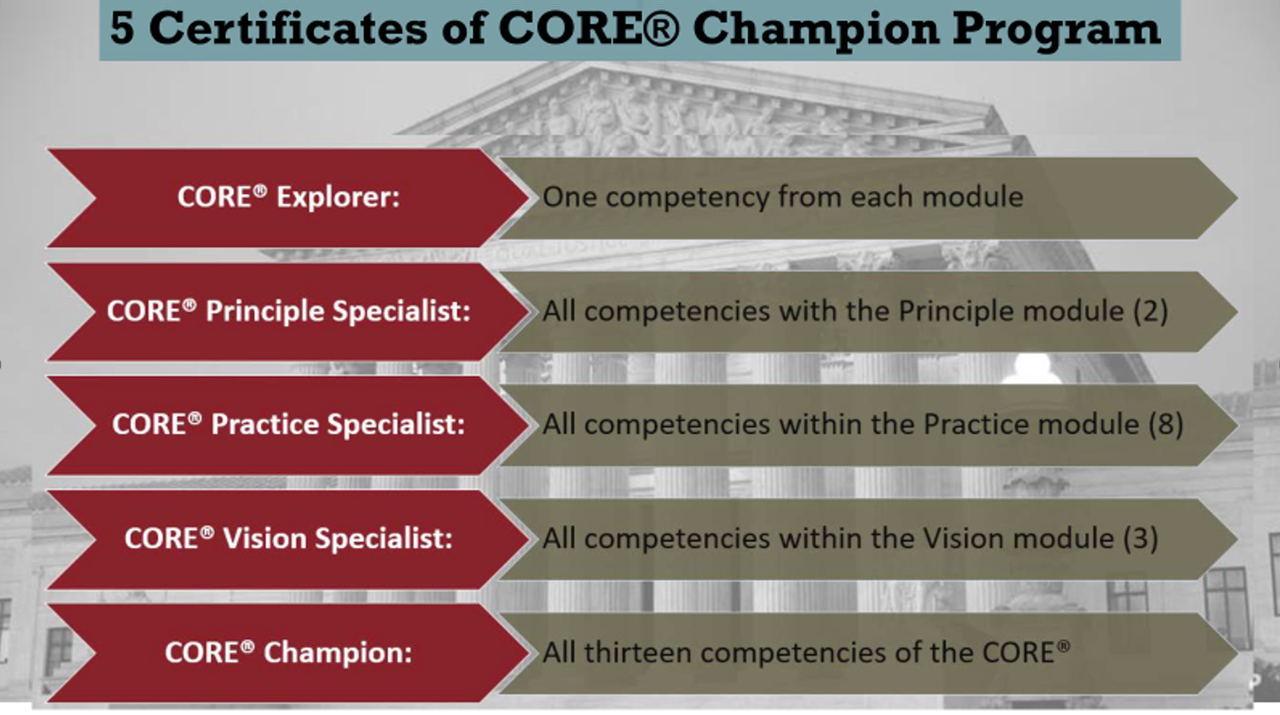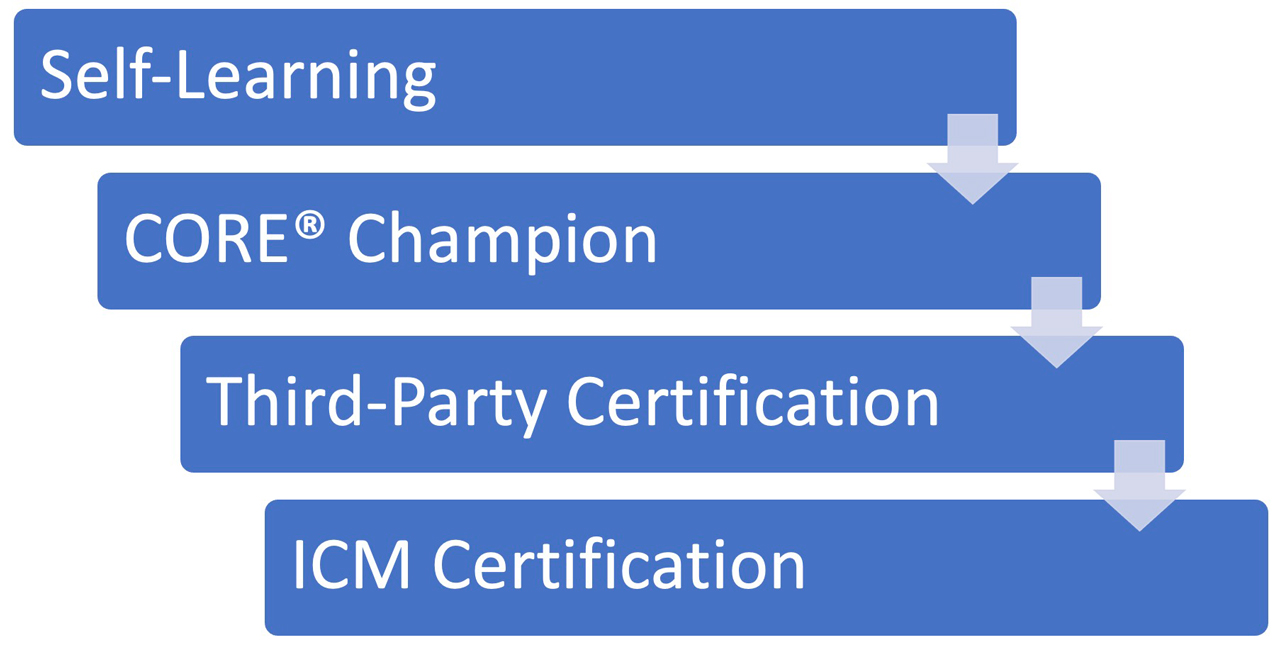The NACM CORE® (https://nacmCORE.org/) is a comprehensive training program for court managers. NACM’s intent in promoting these competencies goes beyond providing information for professionals working in court administration to also promoting excellence in the administration of justice and court management.
Background on the CORE
The CORE® was developed in its current form in 2010 and built upon the original CORE® competencies. To ensure that the curricula remain fresh, relevant, and reflective of current trends and best practices, the CORE® Committee selects two curriculum each year and conducts an in-depth review of content. Review is well underway of “The CORE® in Practice: A Guide to Strengthen Court Professionals through Application, Use and Implementation” and the “Public Relations” curriculum.
The CORE® has been structured to provide consistent information across all competencies. This consistent structure allows the reader to quickly define and review the indicators of competence and to see how the competency is demonstrated in everyday work and in different types of courts/court functions. For more on the history, please see our Contributors page.
The National Association for Court Management offers sincere gratitude to the State Justice Institute (SJI) and the United States Department of Justice, Office of Justice Programs, Bureau of Justice Assistance (BJA) for the financial support of the CORE® Competencies Revision Project. Funding for this project was provided by a partner grant through SJI and BJA. As part of the generous initial support from SJI and BJA and as part of NACM’s mission to advance the field of court management, NACM has placed its CORE® website and content in the public domain.
The NACM CORE® website and the NACM CORE® curricula are copyrighted material. NACM is making such material freely available in our efforts to advance understanding of court administration, public administration, criminal justice, etc. We believe this constitutes a fair use of any such copyrighted material as provided for in section 107 of the U.S. Copyright Law. In accordance with Title 17 U.S.C. Section 107, the material on this site is distributed without profit to those who have expressed a prior interest in receiving the included information for research and educational purposes. For more information, please see our Fair Use Notice and Disclaimer.
CORE® Training Options
Part of NACM’s mission is to promote and encourage the continuing education opportunities of court managers. NACM feels that the mastering the field of court administration is a lifelong process of learning. The CORE® is developed such that those in the field of court administration can become familiar with its principles through self-education, educational sessions, and more in-depth skills-based trainings.
Attend Educational Sessions
NACM and its many partners—National Association of State Judicial Educators (NASJE), state associations, and more—offer a variety of educational sessions that reflect and adapt many of the learning objectives in the various CORE® competencies. The best opportunity for such sessions is a NACM conference. Many of the sessions at NACM conferences are recorded and posted for viewing, with many sessions focusing more in-depth on a CORE® competency. The 2023 NACM Midyear Conference had three CORE® sessions, and the 2023 NACM Annual Conference will have two CORE® sessions: 1) Public Relations and 2) Budget and Fiscal Management.
Participate in the CORE® Champion Program
The purpose of the CORE® Champion Program is fourfold:
- strengthen court professionals
- provide greater exposure to the CORE®
- recognize attendance at qualified CORE® sessions
- allow participants to demonstrate basic understanding on the 13 CORE® Competencies
To become a CORE® Champion, one must be a member of NACM, attend qualified sessions, complete a structured response form for each of the competencies, and then write a short essay for review by the committee. The CORE® Committee tracks completion of the structured response forms and will issue certificates at various points in the program. If the short essay is approved, one would be awarded the CORE® Champion certificate. Educational sessions that a member selects to observe may vary; therefore, in-depth knowledge of a competency is not the goal. The CORE® Champion program is designed to be an introduction to the CORE® and its competencies.
Self-Education
The CORE® may be reviewed by accessing all of the competencies on the CORE® website and reviewing the curricula. Self-learners should start at the beginning and work their way through the competencies from Principle to Practice to Vision. No formal certificates are awarded for this path.
Certification Programs—Third Parties
Other partner organizations, schools, and training organizations may also use the NACM CORE®. Practitioners in the field should consult the provider of the training to assess the level of adherence to the learning objectives outlined in each of the CORE® competencies.
Certification Programs—Institute for Court Management
The National Center for State Courts’ Institute for Court Management uses the course for an in-depth, skills-based certification centered around the CORE® competencies. ICM’s courses were developed using feedback from participants, national and state faculty, the ICM Board of Advisors, and ICM staff. The CORE® was embraced in the curriculum development process to ensure that participants develop knowledge, skills, and abilities that are necessary to be successful in today’s courts. ICM also gratefully acknowledges the National Association of State Judicial Educators for the NASJE Curriculum Design manuals, which were used to ensure that this course adheres to the highest standards of adult education practices. The curriculum addresses the subject from a national perspective.
ICM offers three levels of certification: the Certified Court Manager (CCM) credential, the Certified Court Executive (CCE) credential, and the ICM Fellows Certification. Participants are only eligible for CCE certification if they have achieved CCM status and successfully completed all 13 CCM and CCE courses. ICM also offers an alternate route to complete the Fellows Program (formerly known as the Court Executive Development Program).
In summary, the path to continuing education and professional growth for court leaders has many levels and options to choose from. The associations and programs listed here offer a variety of access points to continuing education and networking, covering the full spectrum of one’s career with the courts.
ABOUT THE AUTHOR
TJ Bement is district court administrator for the Georgia Superior Courts. He is a past president of NACM.





